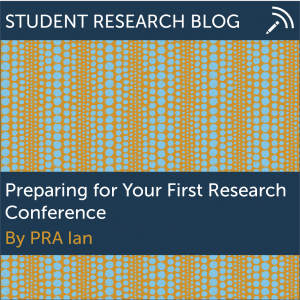 By Ian Sands, OUR Peer Research Ambassador
By Ian Sands, OUR Peer Research Ambassador
Conference presentations are an essential part of any research community. Whatever field you end up doing research in, attending conferences allow laboratories to communicate their recent projects, obtain feedback from their peers, and remain informed regarding up and coming technologies that are gaining attention within that respective field. On top of that, these events allow you to represent your lab and network yourself to other interested parties for potential collaborations. With all this in mind, it’s important to take time to prepare in order to set yourself up for success and represent your research well.
In some cases, you may be lucky enough to have your lab cover all expenses and provide reimbursement for your conference. If you don’t have that type of luck, however, there’s no need to worry because the Office of Undergraduate Research (OUR) provides opportunities to apply for travel funding through the OUR Travel Award. Finances are usually the first concern when applying to a conference out of state so figuring out the logistics of paying for your trip is something OUR can help with.
Your next thought might be to figure out what you’ll wear at the conference. From my own experience, STEM based conferences fall heavier on the business casual to formal side. For me, a dress shirt and nice pair of pants would be a minimum requirement, however it is important to keep in mind that you really should dress to impress. Don’t be hesitant to dress formally since it not only makes a great first impression, but also can help you feel more confident in this new environment.
Once these details are ironed out (exquisite pun), you can begin focusing on your specific goals that you wish to accomplish at this conference. Oftentimes you may find yourself just looking to gain that first time experience to get a feel for what a conference in your field is like. As an undergraduate, however, there are many opportunities that you should explore outside of standing by your poster. Weeks prior to the Biomedical Engineering Society (BMES) conference I attended in October, I made sure to search the list of presentations and presenters I was interested in visiting during my stay and I even made an effort to reach out over email to a few of these labs. As a future Ph.D student, it is crucial to not only attend these events, but network yourself to other labs at schools that you are interested in attending. Once you arrive at the conference, you may find yourself surprised by the large population of people actually interested in your work. The other attendees are at the same conference for the same reason so once you realize this, it becomes remarkably easy to introduce yourself and your research.
If you find yourself at a popular national conference like the one I attended, there is a good chance that graduate programs will have booths set up in a designated area. If graduate school is something you are considering, I cannot stress this enough: Go to those booths and talk to the staff even if it is a school you are still unsure about. A lot of these booths offer discounts or complete application fee waivers for graduate school applications so it will save you a lot of money later down the road if you talk to those representatives.
My last piece of advice is one that seems obvious and easier said than done, but try your best to appreciate the opportunity while you’re there and stress as little as you can. Conferences provide a great chance to network and receive feedback on your work and the more you can stay calm, the more positive interactions you can get out of the experience.
Ian is a senior majoring in Biomedical Engineering. Click here to learn more about Ian.